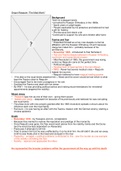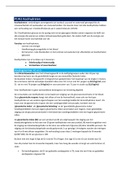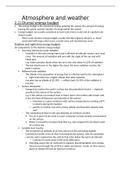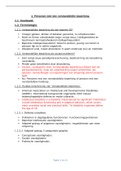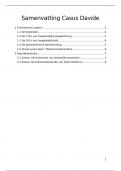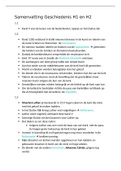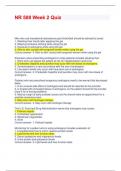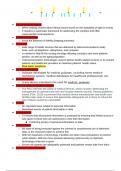Politics End-Term
People:
Machiavelli:
o Political pragmatism
o Renaissance Italy
o Politics are a craft that can me mastered, statesmanship can be learned
Locke:
o Early bipartite system
o The new right theory of the state
o The social contract tradition
o Natural rights: given by God, and this ought to be protected by the state
o Defended free market economy and limited state interference
o Individual rights based on an imaginary state of nature
Hobbes:
o the leviathan
o the social contract tradition
o the new right theory of the state
o the natural state is a war against all
o Individual rights based on an imaginary state of nature
o defended a free-market economy and limited state interference
o
Rousseau:
o The social contract tradition
o The state and the general will
o 18th century free revolutionary France
o Obey the state when it pursues the general will
o The general will can be contrasted by the selfish wills of individuals
o The problem of majority rule: few decisions made will be made unanimously,
some argue that no state can ever be legitimate
C. Wright Mills:
o Critic of classical pluralism: argued that power in American society is
concentrated in the hands of a powerful elite dominating the economic, military,
and governmental shapes
Marx:
o 19th century industrialized Europe
o In search of social justice
o Negatively saw politics as about class conflict if there were no competing
classes there would be no politics
o Class struggle is triggered by technological progress
o Bourgeoisie & proletariat
o Communist manifesto: political power as merely the organized power of one class
for oppressing another
Weber:
o Nation-states & true nature of power
o Europe before and after World War 1
, o The modern state is defined by its monopoly on the legitimate use of force &
there is an important distinction between power & authority
Dahl:
o Pluralism
o A political system is any persistent pattern of human relationships that involves,
to a significant extent, control, influence, power, or authority
o Power: “A has power over B to the extent that he can get B to do something B
would not otherwise do”
Lipset:
o Debate between economic development and democratic change
o The more prosperous a nation, the greater its ability to sustain democracy
Luke’s
o Luke’s: having the means of power is not the same as being powerful
o Three dimensions of power
Politics:
The three political dimensions:
Polity: form; order; constitutions, norms, institutions, organization, law, state, and offices.
Politics: process; implementation; interests, conflict, consensus, power, governance, elections, and
diplomacy.
Policy: content; shape; issues, goals, party, programs, strategy, and ideology.
Views on politics:
Laswell: Who gets what, when, and how?
Plato: The realization of a just order
Machiavelli: the technique of achieving and maintaining power
Fichte: the science of governing a state
Weber: the struggle for a share of power or a redistribution of power within a state
D’Israeli: Politics is the art of governing mankind by deceiving them
Crick: Politics can be defined as the activity by which differing interests within a given unit of rule
are conciliated by giving them a share in power in proportion to their importance to the welfare of
the community.
Politics is inevitable because all societies contain differences that must be tackled in some way.
Karl Marx negatively saw politics as being about class conflict and that if there were no
competing classes there would be no politics. Some view it as unrealistic because it fails to
consider human nature’s tendency towards difference, striving and competition.
End of ideology and end of history (Fukuyama) argue that liberal democratic values gradually
assume a position of dominance across the world which isn’t true because politics continues
changing, we haven’t reached “the end” yet.
Nationalisms cause conflicts to rise as they are biased, politics remain necessary to calm these.
Identity politics created wide views as it is a cultural movement based on a demand for
recognition and respect by groups. Globalization combats this and proves the necessity of politics
as it signals the end of national autonomy as it no longer matters what sovereign governments do
because we are controlled by global economic forces that no one can alter.
Modernization theory: identifies certain quantifiable factors that are inseparably linked to social
progress, such as urbanization, industrialization, infrastructure, mass communication, education etc.
Aristotle’s classification schema: a symbol of good government was the degree to which the rulers
ruled in the interests of all. His preferred form was monarchy and negatively saw democracy.
Polybius: saw politics as a cycle:
People:
Machiavelli:
o Political pragmatism
o Renaissance Italy
o Politics are a craft that can me mastered, statesmanship can be learned
Locke:
o Early bipartite system
o The new right theory of the state
o The social contract tradition
o Natural rights: given by God, and this ought to be protected by the state
o Defended free market economy and limited state interference
o Individual rights based on an imaginary state of nature
Hobbes:
o the leviathan
o the social contract tradition
o the new right theory of the state
o the natural state is a war against all
o Individual rights based on an imaginary state of nature
o defended a free-market economy and limited state interference
o
Rousseau:
o The social contract tradition
o The state and the general will
o 18th century free revolutionary France
o Obey the state when it pursues the general will
o The general will can be contrasted by the selfish wills of individuals
o The problem of majority rule: few decisions made will be made unanimously,
some argue that no state can ever be legitimate
C. Wright Mills:
o Critic of classical pluralism: argued that power in American society is
concentrated in the hands of a powerful elite dominating the economic, military,
and governmental shapes
Marx:
o 19th century industrialized Europe
o In search of social justice
o Negatively saw politics as about class conflict if there were no competing
classes there would be no politics
o Class struggle is triggered by technological progress
o Bourgeoisie & proletariat
o Communist manifesto: political power as merely the organized power of one class
for oppressing another
Weber:
o Nation-states & true nature of power
o Europe before and after World War 1
, o The modern state is defined by its monopoly on the legitimate use of force &
there is an important distinction between power & authority
Dahl:
o Pluralism
o A political system is any persistent pattern of human relationships that involves,
to a significant extent, control, influence, power, or authority
o Power: “A has power over B to the extent that he can get B to do something B
would not otherwise do”
Lipset:
o Debate between economic development and democratic change
o The more prosperous a nation, the greater its ability to sustain democracy
Luke’s
o Luke’s: having the means of power is not the same as being powerful
o Three dimensions of power
Politics:
The three political dimensions:
Polity: form; order; constitutions, norms, institutions, organization, law, state, and offices.
Politics: process; implementation; interests, conflict, consensus, power, governance, elections, and
diplomacy.
Policy: content; shape; issues, goals, party, programs, strategy, and ideology.
Views on politics:
Laswell: Who gets what, when, and how?
Plato: The realization of a just order
Machiavelli: the technique of achieving and maintaining power
Fichte: the science of governing a state
Weber: the struggle for a share of power or a redistribution of power within a state
D’Israeli: Politics is the art of governing mankind by deceiving them
Crick: Politics can be defined as the activity by which differing interests within a given unit of rule
are conciliated by giving them a share in power in proportion to their importance to the welfare of
the community.
Politics is inevitable because all societies contain differences that must be tackled in some way.
Karl Marx negatively saw politics as being about class conflict and that if there were no
competing classes there would be no politics. Some view it as unrealistic because it fails to
consider human nature’s tendency towards difference, striving and competition.
End of ideology and end of history (Fukuyama) argue that liberal democratic values gradually
assume a position of dominance across the world which isn’t true because politics continues
changing, we haven’t reached “the end” yet.
Nationalisms cause conflicts to rise as they are biased, politics remain necessary to calm these.
Identity politics created wide views as it is a cultural movement based on a demand for
recognition and respect by groups. Globalization combats this and proves the necessity of politics
as it signals the end of national autonomy as it no longer matters what sovereign governments do
because we are controlled by global economic forces that no one can alter.
Modernization theory: identifies certain quantifiable factors that are inseparably linked to social
progress, such as urbanization, industrialization, infrastructure, mass communication, education etc.
Aristotle’s classification schema: a symbol of good government was the degree to which the rulers
ruled in the interests of all. His preferred form was monarchy and negatively saw democracy.
Polybius: saw politics as a cycle:


